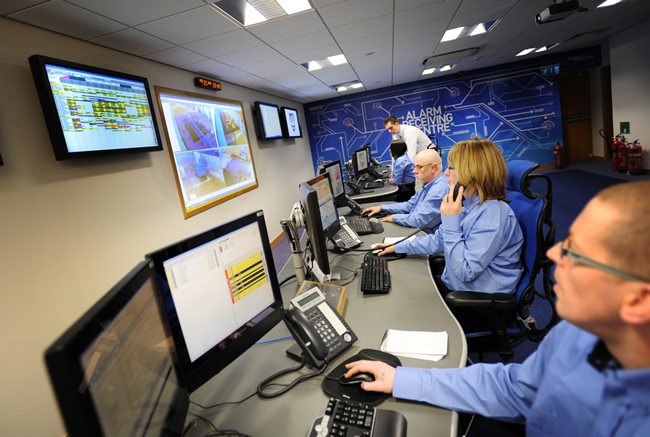An unmonitored alarm can act as a deterrent to intruders. If it’s triggered, it’s likely to reduce the amount of time they’ll be in your premises and it alerts other people to the fact there’s a problem. But to a large extent it does rely on your neighbours responding to it. In many instances that’s a reasonable assumption; if your alarm’s triggered at home and you’re part of a neighbourhood watch scheme, for example, you’d expect that someone would react.
But in other instances – perhaps if the alarm went off when your business was unoccupied – there might not be anyone around who’d take action. That’s when having your alarms and other security systems monitored can be of significant benefit.
What does alarm and CCTV system monitoring involve?
The technical details may vary but the principles are similar. If a fire or intruder alarm is triggered or something of concern is detected via a CCTV system at any time of day or night, a signal goes to a monitoring station to alert them to the fact that there’s potentially a problem at your premises.
There are several ways in which that signal can be sent to the monitoring company. Messages can be sent over telephone lines or by using wireless technology or broadband connections. Dual path signalling is increasingly being used so there are at least two independent ways to send the message in case of signal loss or malicious activity.
Usually you’d then be contacted to check whether it’s a real emergency or whether the alarm’s been triggered incorrectly. If there’s no response, or you confirm it hasn’t been accidentally set off, the monitoring service will initiate appropriate action which could include calling the emergency response services (including the police as long as your systems meet the requirements of the
police response to security systems policy).
Should you have a monitored alarm?
It’s possible to install a self-monitored alarm, where you’re directly alerted via your phone, but this relies on you being continually able to monitor your messages in real time. A monitored alarm offers the security of having constant surveillance 24 hours a day 365 days a year plus access to experts who know how to respond to any emergencies that arise.
Setting up alarm and security systems so they can be monitored can be done very cost effectively. It doesn’t automatically require complex installations or replacement of existing systems. Businesses can even choose to take advantage of dual communications monitoring and have their alarm systems and CCTV systems connected together for central monitoring. If there was an incident, the monitoring centre can visually check your premises to quickly establish what’s happening and initiate action immediately.
Having your alarm and security systems monitored will have an impact on your insurance too. In fact, the majority of insurance companies expect commercial premises to have alarm systems that are monitored by an approved alarm receiving centre. Your system(s) will need to meet the standards set out by both your insurer as well as the police so get all installation work and ongoing maintenance done by a
professional third party approved company. A reputable installation and maintenance company will use, or be able to recommend, a monitoring company that’s registered with the local police force.
Monitoring your alarms is an excellent way to help protect your people, possessions and property. If you’d like to find out more about monitoring your
fire alarms,
intruder alarms or
CCTV camera systems (or all three!), then
please do get in touch with us for advice and a free site survey. 